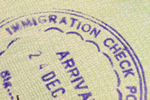Costs And Paperwork Involved With Property In Canada
 Costs And Paperwork Involved With Property In Canada
Costs And Paperwork Involved With Property In Canada
The paperwork to transfer title of property is quite simple and will be arranged and processed by your real estate agent. There is a property transfer tax to pay when buying any form of property, which is somewhere between 0.5 and 2 per cent of the total value of the real estate. This rate varies with each province, but it's typically 1 per cent of the first C$200,000 valuation and 2 per cent of the remaining valuation.
Brand new homes are subject to Canada's Goods and Services Tax (GST), which is 5 per cent of the purchase price. If the home cost less than C$350,000 you can apply for a rebate for part of the GST paid, as long as you plan to designate it your primary residence in Canada. There is also a Provincial Sales Tax (PST) involved but this is usually factored into the selling price of the property.
Depending on the kind of real estate you are purchasing and whether you are using a bank for financing, there will be other fees to deal with. Your bank might require a new appraisal of the property's value, which can cost between C$150 and C$250. The bank will also want to see a current survey of the property. If there is none or the existing one is too old, the cost of a new survey can cost around C$250.
A home inspection fee costs about C$450 and is highly recommended for the buyer to ensure that there are no hidden issues lurking within the property. When it comes time to sign the title transfer, many buyers hire a lawyer to look over the contract and make sure there are no problems with the original property title. Lawyers in Canada charge between C$500 and C$800 for this service.
Once you own the property, the taxation doesn't end there. Each year, the local county where the property is located will assess the current value of the real estate and charge you a property tax. This tax is typically between 0.5 and 2.5 per cent of market value of the property, and varies by province.
When selling property, you will have to pay capital gains taxes if you are a non-resident of the country. This hefty tax is 50 per cent of any profit you make from selling the property over the original purchase price. Residents of Canada are exempt from capital gains, as long as they were using the property as their primary residence.


